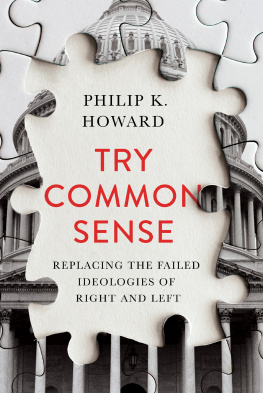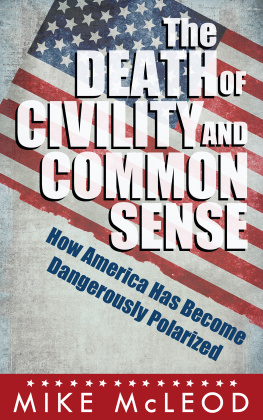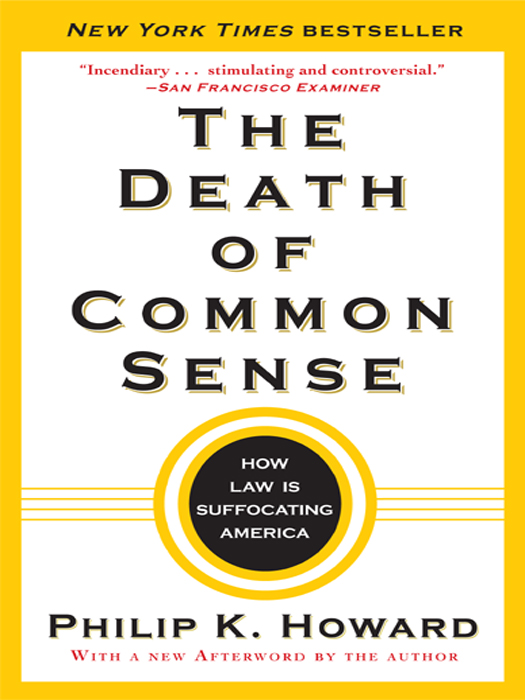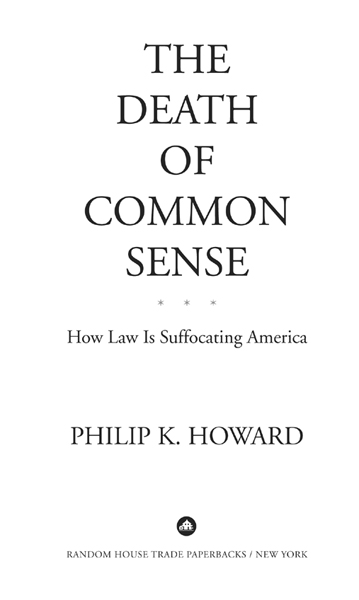Praise for
The Death of Common Sense
Mr. Howards argument is fresh, reflecting an impressive combination of wisdom, wry humor, and quiet passion. When we think about reinventing government, its a good place to start.The New York Times Book Review
The delights of this policy prose poem lie in its perfect details, its civilized tone, its sure sense of where the ill-made legal shoe pinches.The Wall Street Journal
One of the most important, thought-provoking books Ive read in years, and it will grip you from the very first page. Every doctor and teacher frustrated by paperwork, every judge frustrated by mandatory sentencing guidelines, every banker and businessman tied in regulatory knots, every manager terrified to fire someone for doing a poor jobevery taxpayerwill find The Death of Common Sense a blood-boiler. What makes it important, though, is not its (amazing) anecdotes, but that it so elegantly synthesizes them and points to solutions.A NDREW T OBIAS
Lucid, economical prose its lessons are valid and needed therapy for our suffocating democracy.Baltimore Sun
Packed with splendid examples of absurd regulatory inflexibility.The Seattle Times
A wildly important book which should change the direction of public debate in this country. Not often does a book appear that is startling and yet so obviously correct. Philip Howard gives Americans their voice back.A NDREW H EISKELL , former publisher of Time, Inc.
Howard cuts through the obfuscatory fog of government and shows a path to sanity.The Tampa Tribune
In less than 200 pages, The Death of Common Sense explains why government drives us crazy. That alone makes for satisfying reading.Fort Worth Star-Telegram
Timely and well-done.Chattanooga NewsFree Press
A detailed and remarkably dispassionate account of how pointless regulation has replaced common law and common sense. He is right.The Houston Post
Challenges fundamental and usually unexplored assumptions and points out that the Enlightenments promise of wisdom through reason is far from being achieved.Los Angeles Times
A powerful argument This is fresh thinking.St. Petersburg Times
A good bookwill make the reader think will generate further discussion.The Detroit News
Eloquent a call for personal responsibility and initiative in government a valuable book.People
A three-count indictment of some poisoned fruits of modern liberalism Among the things that make this book work are its examples.Houston Chronicle
An urgent, provocative polemic It explains better than anything Ive seen why too many laws and regulations are everyones nightmare.Lexington Herald-Leader
Trenchant and often witty prose A devastating indictment of the micromanagerial excesses of regulatory law based upon the creation of artificial rights. Commonweal
Both provocative and important. It is not only a cry of outrage but also a plea to force our government to make sense.The Flint Journal
A very useful new book.The New York Observer
Also by Philip K. Howard
The Collapse of the Common Good
Life Without Lawyers
2011 Random House Trade Paperback Edition
Copyright 1994, 2011 by Philip K. Howard
All rights reserved.
Published in the United States by Random House Trade Paperbacks, an imprint of The Random House Publishing Group, a division of Random House, Inc., New York.
R ANDOM H OUSE T RADE P APERBACKS and colophon are trademarks of Random House, Inc.
Originally published in hardcover and in slightly different form in the United States by Random House, an imprint of The Random House Publishing Group, a division of Random House, Inc., in 1994 and subsequently in trade paperback in the United States by Grand Central Publishing in 1996.
Library of Congress Cataloging-in-Publication Data
Howard, Philip K.
The death of common sense : how law is suffocating America/
Philip K. Howard.
p. cm.
eISBN: 978-0-679-64410-1
1. LawUnited States. 2. Law reformUnited States.
3. BureaucracyUnited States. 4. Common sense. I. Title.
KF384.1169 1996
345.73dc20
[347.3] 95-37410
www.atrandom.com
Cover design by Andy Carpenter
Cover design: Flamur Tonuzi
v3.1
For Olivia, Charlotte, Lily, and Alexander,
and for Alexandra
CONTENTS

I
THE DEATH OF COMMON SENSE
II
THE BUCK NEVER STOPS
III
A NATION OF ENEMIES
IV
RELEASING OURSELVES
I
THE
DEATH
OF
COMMON
SENSE
I N THE WINTER OF 1988 , NUNS OF THE M ISSIONARIES OF C HARITY were walking through the snow in the South Bronx in their saris and sandals to look for an abandoned building that they might convert into a homeless shelter. Mother Teresa, the Nobel Prize winner and head of the order, had agreed on the plan with Mayor Ed Koch after visiting him in the hospital several years earlier. The nuns came to two fire-gutted buildings on 148th Street and, finding a Madonna among the rubble, thought that perhaps providence itself had ordained the mission. New York City offered the abandoned buildings at one dollar each, and the Missionaries of Charity set aside $500,000 for the reconstruction. The nuns developed a plan to provide temporary care for sixty-four homeless men in a communal setting that included a dining room and kitchen on the first floor, a lounge on the second floor, and small dormitory rooms on the third and fourth floors. The only unusual thing about the plan was that Missionaries of Charity, in addition to their vow of poverty, avoid the routine use of modern conveniences. There would be no dishwashers or other appliances; laundry would be done by hand. For New York City, the proposed homeless facility would be (literally) a godsend.
Although the city owned the buildings, no official had the authority to transfer them except through an extensive bureaucratic process. For a year and a half the nuns, wanting only to live a life of ascetic service, found themselves instead traveling in their sandals from hearing room to hearing room, presenting the details of the project and then discussing the details again at two higher levels of city government. In September 1989 the city finally approved the plan and the Missionaries of Charity began repairing the fire damage.
Providence, however, was no match for law. New Yorks building code, they were told after almost two years, requires an elevator in every new or renovated multiple-story building. The Missionaries of Charity explained that because of their beliefs they would never use the elevator, which also would add upward of $100,000 to the cost. The nuns were told the law could not be waived even if an elevator didnt make sense.
Mother Teresa gave up. She didnt want to devote that much extra money to something that wouldnt really help the poor: According to her representative, The Sisters felt they could use the money much more usefully for soup and sandwiches. In a polite letter to the city expressing their regrets, the Missionaries of Charity noted that the episode served to educate us about the law and its many complexities.













